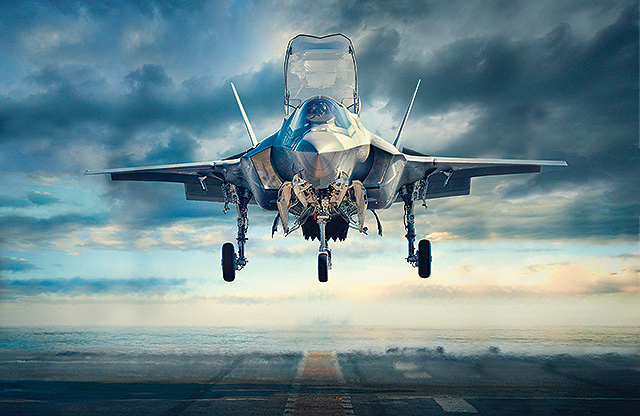The Air Force Research Laboratory awarded UConn an additional $10.5 million for projects related to welding and advanced materials for high-temperature applications

Jet landing.
A team of UConn researchers is taking on a high-speed, high-altitude challenge.
UConn and the U.S. Air Force Research Laboratory (AFRL) are continuing their partnership with a new $10.5 million contract. The funding will support the University's research into aerospace manufacturing challenges. To date, project funding is approaching $30 million.
"For generations, defense technology has been a backbone to Connecticut's economy," says Pamir Alpay, UConn's Vice President for Research, Innovation, and Entrepreneurship, as well as a recipient of AFRL funding. "Our work with the AFRL continues a tradition that extends from flight and navigation to world-class engines to undersea technology. UConn scientists and engineers are using knowledge and applied science to advance the aerospace industry."
The new funding focuses on manufacturing obstacles in aerial systems intended to fly at very high speeds. Seven faculty members - along with teams of post-graduate and graduate students - will conduct research into welding-related challenges for high temperature metallic materials and into the development of advanced materials for high temperatures. These connected, interdisciplinary projects include researchers from material science and engineering, mechanical engineering, civil and environmental engineering, and chemistry.
The primary investigator on the project is Professor Rainer Hebert, also the Director of the Pratt & Whitney Additive Manufacturing Center and associate director of the Institute of Materials Science. Several major companies fund research labs within the Innovation Partnership Building (IPB) at UConn Tech Park, collectively investing hundreds of millions of dollars to advance Connecticut's technology capital.
"Working with AFRL for the last years has sharpened our sense of application relevance," says Hebert. "In our latest contract, we now work very closely with industry including Raytheon, Pratt & Whitney, and Collins Aerospace, continuing to improve the model of government, industry, and academia integrated research collaborations.
The relationship with the AFRL has been fruitful for both UConn and its partner.
"For us in academia, seeing our research transition towards a product is an interesting alternative to other research projects that remain at the fundamental research level," Hebert says. "For AFRL, our solutions to applied problems that derive from basic research offer an alternative of its own kind, one that sets us apart from industry and their solutions that are often dictated by tight production schedules."
The new grant will fund a four-year research project that combines experimental and theoretical approaches to advance materials provided to corporate partner RTX (formerly Raytheon). Hebert says the project tasks include addressing the behavior of non-metallic, high-temperature materials under different processing and service conditions.
Research will also be conducted into additive manufacturing of high-temperature refractory metals and the design and processing of metamaterials. Hebert says the metamaterials can modify heat- and electromagnetic fields with tailored structures, achieving, for example, unprecedented thermal management.
UConn's partnership with the AFRL extends back to 2018 and the launch of the first contact, which leveraged UConn expertise in several areas related to advanced manufacturing. Such disciplines include casting, heat treating, ceramics, additive manufacturing, systems engineering, and several more.
The collaboration includes several industry partners deeply rooted in Connecticut, More than 15 UConn faculty members as well as dozens of graduate and post-grad students have contributed to efforts to provide transformative capabilities on manufacturing technologies to the AFRL, original equipment manufacturers, and supply chains.
"Covering research from functional materials and photonics to casting, welding, and additive manufacturing, the UConn team has established itself as a valuable partner for the AFRL and other key industry partners," Hebert says.
The following faculty members will work on projects covered through the $10.5 million contract:
Mark Aindow, Material Science and Engineering (MSE)
Pamir Alpay, Vice President for Research, Innovation, and Entrepreneurship
Osama Bilal, Mechanical Engineering
Lesley Frame, MSE
Jeongho Kim, Civil and Environmental Engineering
Rainer Hebert, MSE
Steven Suib, Chemistry






